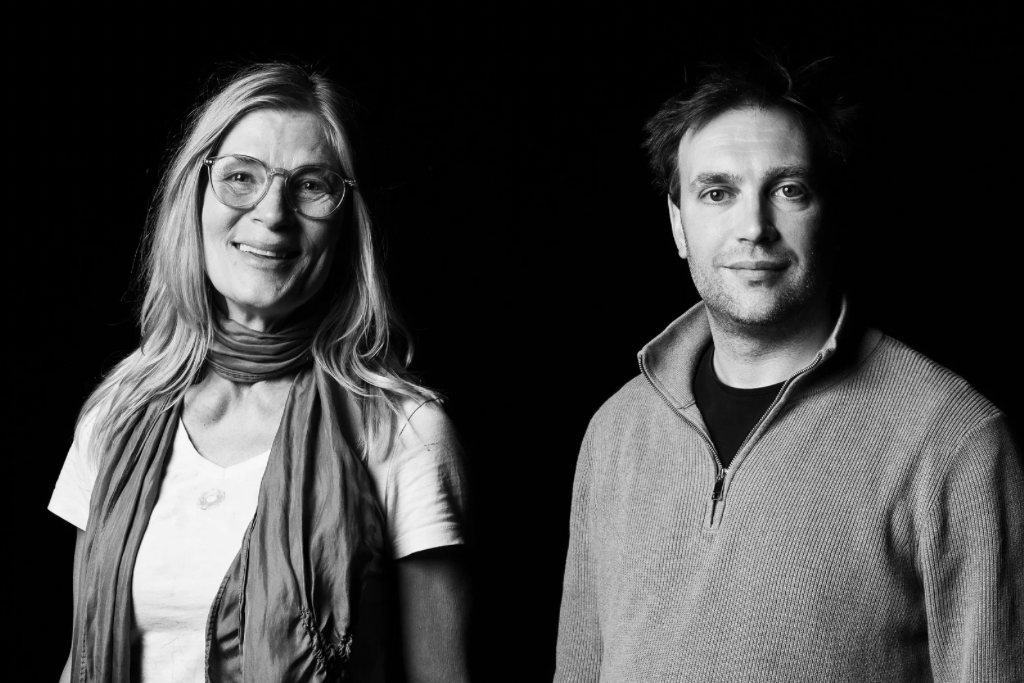Hope, forgiveness and rebirth
From the very first moment that musical director Karel Deseure and director, choreographer and aerialist Dreya Weber meet, they find themselves in an intense conversation about Silenzio, Le Villi, and theatre as a whole. They are completely aligned when it comes to the heart of this opera: hope, the possibility of forgiveness, and rebirth, all captured in the theatrical, magical image of a living forest full of Villi.
What is it like to conduct the brand-new work Silenzio of Karmit Fadael?
Karel: ‘It’s incredibly exciting and a huge responsibility. I’m the first conductor to interpret it, the first to discover the music. I just hope I can make it sound the way Karmit imagined it in her mind.’
What is the connection between Silenzio and Le Villi, Puccini’s first opera?
Dreya: ‘Le Villi begins in the middle of the story, at Roberto and Anna’s engagement celebration. We already see that Anna’s mother is missing. So much has happened before we even begin. Silenzio gives us the chance to explore and understand Anna’s inner world.’
Karel: ‘In Puccini’s work, there’s very little focus on Anna’s thoughts and questions. That we now begin Silenzio from that perspective is something I find truly fascinating. In Le Villi, the focus is more on Roberto – the one who caused the suffering – and his pain. Anna’s grief is hardly seen. Only at the end she sings of how deeply she suffered in silence, so much so that she died of sorrow. Musically, that’s portrayed so beautifully: Roberto and Anna sing in unison in a low register, where the voice sounds more fragile than in the higher. That vulnerability expresses such deep pain; both in the ‘betrayer’ and in the one who was betrayed. Gorgeous.’
What does your direction look like, Dreya?
Dreya: ‘In my direction, the Villi are spirits of people who died of a broken heart, their souls reborn as the trees of the forest. That cycle of life and death is a key theme in this piece. The forest of the Villi is both witness to the unfolding story and an active participant. It’s the wildness of the forest that makes it hard for Roberto in the end to breathe, he feels suffocated. But is it the Villi causing this, or is it his own guilt taking his breath away?’
How do you incorporate aerial work into the opera?
Dreya: ‘A theatre teacher once told me: ‘Sometimes characters must sing, because there’s no other way to express what they’re feeling.’’
Karel (interrupts enthusiastically): ‘That’s exactly how I feel about opera! It’s like simply speaking the words isn’t enough, it has to be sung.’
Dreya: ‘Exactly. And that’s how I feel about being in the air. Sometimes the drama transcends the earth. Some moments are too vast for the ground, then there’s only the sky.’
What are your thoughts on Puccini’s music?
Karel: ‘Puccini is a genius. People call Le Villi a youth work, but everything that characterizes his later music is already here! He had the incredible gift of writing deeply moving melodies, and no one captures human emotion like Puccini. In the aria sung by Guglielmo, Anna’s father, he writes straziante – that means that it must be played heartbreakingly. I’ve never seen that word in a score by any other composer. And it truly sounds that way: the cellos – representing Guglielmo’s inner turmoil – play over a sustained low note that stays fixed, like he is stuck in his grief.’
Dreya: ‘The magnitude of emotion Puccini conveys… I get chills every time I hear his music. He knows exactly what humanity should sound like.’
Karel: ‘I believe that’s the most important purpose of theatre: to give space to human emotion, to feel empathy for characters, even if you don’t agree with their actions, to still understand where they’re coming from.’
Dreya: ‘That’s why it’s so important to me that this work offers hope. We all make mistakes – just like Roberto – but the chance to reinvent yourself, to be forgiven… it really does exist.’
Interview: Kyra Bertram
